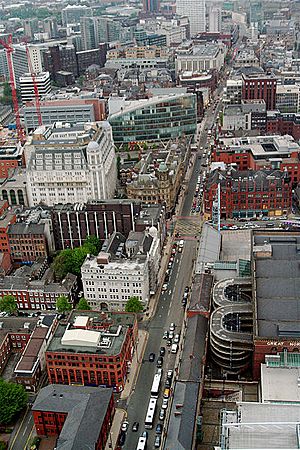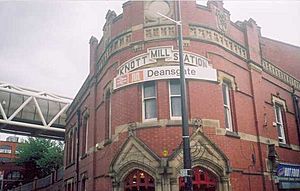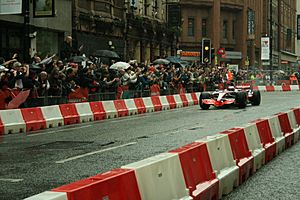Deansgate facts for kids
 |
|
|---|---|

Aerial view of Deansgate from the Beetham Tower
|
|
| Length | 1.0 mi (1.6 km) |
| Location | Manchester, UK |
| North end | Victoria Street |
| South end | Castlefield |
| Other | |
| Known for | Shopping, Kendals, the Great Northern Warehouse, the John Rylands Library, Beetham Tower, Manchester Cathedral |
Deansgate is a major road in the heart of Manchester City Centre, England. It stretches for over a mile, running mostly straight from north to south through the western part of the city. It's one of Manchester's oldest and most famous streets, known for its shops, historic buildings, and modern skyscrapers.
History of Deansgate
A Journey Through Time
Deansgate has a very long history, dating back to Roman times! Its path was near the Roman fort called Mamucium. This road led from the River Medlock towards Chester. Along the way, there were buildings and a special stopping place for travelers.
Part of Deansgate was once known as Aldport Lane. This name came from Saxon times. Aldport was the Saxon name for the area now called Castlefield. Until the 1730s, the area was mostly countryside. But it grew into a busy place after a quay (a place for boats to load and unload) was built on the river.
Where Did the Name Come From?
The name Deansgate comes from a lost river called the River Dene. This river might have flowed along the Hanging Ditch. It connected the River Irk to the River Irwell at the northern end of the street. The word 'Gate' in Deansgate comes from the Norse word gata, which means 'way' or 'road'.
Deansgate in the Past
By the late 1800s, Deansgate was a mix of different things. The northern part had shops and large office buildings. Further south, there were working-class areas. The Wood Street Mission started helping people there in 1869. Their work continues today, though in a different way.
South of Peter Street, the eastern side of Deansgate was dominated by railway bridges. These belonged to the Great Northern and Manchester South Junction Railways. The Rochdale Canal also crossed under Deansgate. In the late 1900s, the Manchester Evening News newspaper had its main office here. Now, that area is part of the modern Spinningfields development.
Exploring Deansgate
Starting Points and Connections
Deansgate begins at Victoria Street, which was created in the 1800s. On its east side, there were once grand buildings called Victoria Buildings. They were sadly destroyed during a bomb raid in 1940.
At the northern end of Deansgate, you'll find Manchester Cathedral on Victoria Street. At the southern end is Deansgate railway station. Here, Deansgate connects with Bridgewater Viaduct and Chester Road. Whitworth Street West also meets it at this point. The section south of Peter Street was called Aldport Street until the late 1700s.
Shops and Famous Spots
Deansgate is home to many shops. These include a House of Fraser department store, which was known as Kendals for many years. You can also find Waterstones bookshop here. There are many public houses and bars, too. One famous pub is the Moon Under Water. It used to be a cinema. This pub is so big that it's listed in The Guinness Book of Records as the largest pub in Britain.
Elliot House used to be the Manchester Registry Office. Before that, it held the offices for the city's Education Department.
Modern and Historic Buildings
The northern end of Deansgate was badly damaged in the 1996 Manchester bombing. After this, the area was rebuilt. Now, it has many new buildings, like No. 1 Deansgate and the Manchester branch of Harvey Nichols.
Other important buildings in the Deansgate area include the Royal Bank of Scotland and the tall Beetham Tower. The Great Northern Warehouse has also been redeveloped. For historic buildings, you can visit the beautiful John Rylands Library and the Barton Arcade shopping mall. Did you know that a disused canal, the Manchester and Salford Junction canal, runs underneath Deansgate below the Great Northern Warehouse?

Getting Around Deansgate
Trains, Trams, and Buses
Today, Deansgate is a major transport hub. You can find National Rail and Manchester Metrolink stations here. Many bus routes also use the street, including the special Metroshuttle services.
Deansgate Station first opened in 1849. It is connected to Deansgate-Castlefield Metrolink station on the Metrolink tram system.
In the early 1900s, trams ran along Deansgate. Later, many bus services used the road. In the 1970s, some bus routes were changed. Nearby streets like King Street were made into pedestrian-only areas.
Calls for Pedestrianisation
In 2009, some people suggested banning cars from Deansgate. They wanted it to become a street just for people walking. This idea came up when parts of Deansgate were closed for road works. Some thought closing the road would hurt businesses. Others believed a car-free Deansgate would bring more shoppers. Victoria Street, the short section near Manchester Cathedral, has already been made pedestrian-only.
In 2019, a group called Extinction Rebellion held a protest on part of Deansgate for four days. They set up tents and held talks about climate change. This event brought up the idea of pedestrianising Deansgate again.
Recent Changes to Traffic
In 2022, new, wider cycle lanes were added. A bus lane also opened at the junction of Blackfriars Street and Deansgate. This lane is for southbound buses, taxis, and bicycles. From Bridge Street to Quay Street, Deansgate is now permanently one-way for southbound traffic only.
The city's "free bus" services (routes 1, 2, and 3) operate around the city centre. All three of these routes have stops on Deansgate.
Events on Deansgate
A Venue for Sports
Deansgate's long, straight layout makes it a great place for sporting events in the city centre. In 2006, A1 Racing cars visited Manchester to launch the A1 Grand Prix. They used Deansgate as part of their route. In August 2011, thousands of people watched Jenson Button drive a McLaren MP4-23 Formula 1 car down Deansgate. This was part of the Vodafone VIP Live Manchester festival.
The Great City Games
In 2001, the first Great City Games took place on Deansgate. This event featured a 150-meter sprinting track. Now, it's an annual event held during the Great Manchester Run weekend in mid-May. Famous athletes have set records here. Usain Bolt set a world record for the 150-meter straight sprint in 2009. Tyson Gay ran the 200-meter straight in record time in 2010.
 | Lonnie Johnson |
 | Granville Woods |
 | Lewis Howard Latimer |
 | James West |



